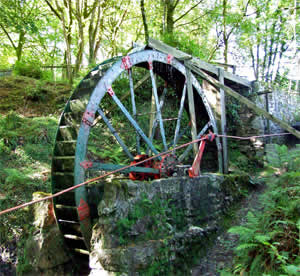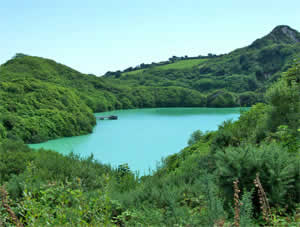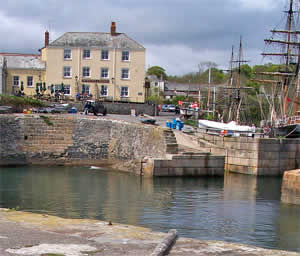St Austell |
|
 |
|||
Cornwall's most popululated town, which grew because of its china clay industry |
|||||
Listen to this article |
|||||
|
|||||
St. Austell is the most populous town in Cornwall. It has even more people than the county's only city of Truro. |
|||||
The settlement used to be a modest mining town, but then, in the 18th century, a Devonshire chemist called William Cookworthy discovered vast deposits of a mineral called "Kaolin" in the area. This substance is better known as "china clay", and it is used in a host of important industries, including porcelain, paper, and textiles. The deposits in Cornwall and Devon were later found to make up the greatest concentration of china clay in the world. St. Austell became focused around the extraction of this mineral, and this caused a sudden spurt in the town's growth. In today's money, the china clay industry was worth around 15 billion. |
|||||
This part of the St. Austell's history is explored at the China Clay Country Park, on the outskirts of the town. It is set within the grounds of two former clay pits, surrounded by woodland. The museum here explains the various mining techniques and processes. It has Cornwall's largest water wheel, and there are also some great walks through the trees. |
|||||
 The water wheel in China Clay Country Park Photo madnzany |
|||||
 Lansalson Pit, adjacent to the Wheal Martyn China Clay Museum Photo madnzany |
|||||
Another of the town's oldest businesses is the St. Austell Brewery, which was established in 1851. There is a visitor centre here, which guides you through the various processes involved in brewing ale. Of course, there is also a bar, where you can sample the finished product! |
|||||
Just a few kilometres away from St Austell's centre is its port, which is called Charlestown. It's worth making the trip, especially when one of the harbour's tall ships is in port. During the summer months, these are often open to the public, so you can have a good poke around. The vessels really do look like a relic from a day gone by, but they don't look out of place in Charlestown, which still retains its Georgian character. In fact, it is often used in television, to represent old ports in period dramas. |
|||||
 Part of Charlestown Photo Dave Goodman |
|||||
There are quite a few beaches scattered along the nearby coastline, some within walking distance of the harbour. The area is sometimes referred to as the "Cornish Riviera". The beaches range in size and style, from the bigger, more family-orientated Porthpean, to the smaller, calmer Polkerris. |
|||||
Almost every visitor to the town of St. Austell will also travel to a nearby attraction called the Eden Project, which is only 3 kilometres away. This astounding, bizarre-looking place is easily the top tourist destination in the entire county. It features several huge, transparent domes, within which the temperature and climate can be carefully controlled. The domes are home to an incredible variety of trees and plants, which are usually found in tropical or Mediterranean environments. The site features several outdoor gardens and sculptures, as well as an education facility. Plans are underway to construct another themed dome, which will house a desert environment. |
|||||
 Wandering inside the Biome's of the Eden Project Photo Samuel Mann |
|||||
The Eden Project may receive many times the amount of visitors that St. Austell does, but thanks to the increased amount of tourists in the area, more and more people are discovering this interesting historic town. |
|||||
|
|||||
St Austell Tourist Information Centre, Southbourne Road, St Austell, PL25 4RS. Tel: 01726 879 500 |
|||||
The China Clay Country Park is open daily from 10pm to 4pm. Entry costs around £8 for adults, children £5. Wheal Martyn, Carthew, St Austell PL26 8XG. Tel: 01726 850 362 |
|||||
St. Austell Brewery is open Monday to Saturday from 10am to 5:30pm (4pm Saturday) and Sundays in August. Entry costs around £8 for adults, £5 children. 63 Trevarthian Road, St Austell PL25 4BY. Tel: 01726 66022 |
|||||
|
Pocket Britain is optimised for use on a smartphone or tablet with internet access. All content is subject to copyright. All reasonable methods have been used to ensure information supplied is accurate at the time of publication. However, it is advisable to check information before relying on it. Privacy Policy |